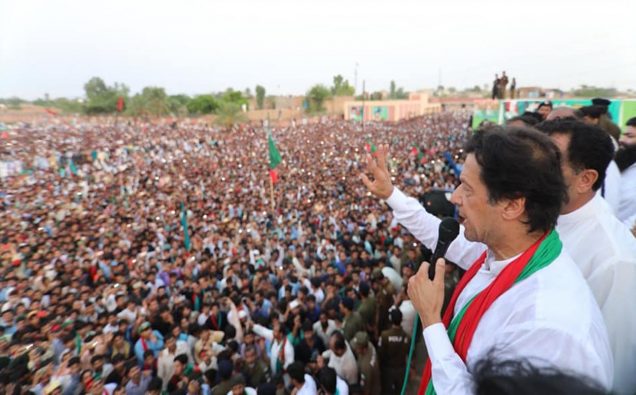
Twenty two years after forming Pakistan Tehreek-e-Insaaf, cricketer-turned-politician Imran Khan has won victory for his party in Wednesday’s general elections in the South Asian country of huge importance to world powers.
With 120 seats in the National Assembly, the PTI has emerged as the largest single party and Imran Khan seems all set to form a government in Islamabad in a coalition format.
Jailed former premier Nawaz Sharif’s Pakistan Muslim League-Nawaz was ahead in over 60 seats and the Pakistan Peoples Party led in 45, with the other rest split among smaller parties.
It is for the first time since late 1990s that a large nationally popular party has replaced PML(N) and PPP, that are both led by members of political dynasties.
While Sharif’s party and the PPP denounced irregularities in the election, Khan could strike deals with independent lawmakers to form a coalition.
“The overwhelming sentiment in favour of PTI all over the country proves that the people of Pakistan now want IK as their leader and PTI as the party in power to bring about the much needed change this country has been waiting for,” Naeemul Haque , the spokesman of Imran Khan tweeted.
The major rival of PTI, Pakistan Muslim League (N) has outrightly rejected the results of the country-wide elections to the national and provincial assemblies.
“ These are the dirtiest elections we have ever witnessed in Pakistan,” President of PML (n), Shahbaz Sharif told a press conference in Pakistan’s eastern city of Lahore.
The Election Commission of Pakistan (ECP) denied the PML (N) claims, saying a new electronic results system suffered unexpected glitches. Despite the technical issues, “these elections were 100 percent fair and transparent”, said Chief Election Commissioner Sardar Muhammad Raza said.
However, Hina Jilani of Human Rights Commission of Pakistan points out several factors like the roles of the military establishment, judiciary and pressures on the media – that shaped the election and campaign and tilted it in favor of Imran Khan’s party.
Pakistan stock market, however, responded vigorously to the PTI victory and the relatively smooth election, throwing up a bullish trend on Thursday morning.
The benchmark KSE-100 index gained 767 points to reach 42,106 points.
Chairman Imran Khan’s ex-wife, Jemima Goldsmith, has said that after 22 years of humiliations, hurdles and sacrifices, her “sons’ father is Pakistan’s next PM”.
Analysts see prospects for improvement in the U.S.-Pakistan relations, though not entirely due to the election but in terms of change in Washington’s approach to end the conflict in Afghanistan.
In a discussion with Views and News in Washington, Anwar Iqbal of Dawn said the Pakistani and American military continue to have close links and discussions while Asad Khan of Voice of America says both President Donald Trump and Imran Khan have favored an approach involving dialogue with the Taliban to find peace and stability in Afghanistan.
Pakistan’s help remains critical to any efforts to stabilize Afghanistan. Imran Khan, in his victory speech, expressed his support for efforts to bring peace and stability to Afghans, who he said, have suffered the most in the war.
In a congratulatory tweet, Jemima stated that Imran’s ‘victory’ today is “an incredible lesson in tenacity, belief and refusal to accept defeat”.
She advised that the “challenge now is to remember why he entered politics in the first place”.
Pakistan’s next leader will urgently need to deal with a mounting economic crisis: four currency devaluations since December have made it likely the next government will seek another International Monetary Fund bailout.
The election may also open up the possibility of Pakistan’s new arrangement with the the IMF .
In the United States, Pakistani-American saw new hope for the country from PTI’s win.
Pakistan Peoples Party co-chairman Bilawal Bhutto Zadari, 29, son of former prime minister Benazir Bhutto, expressed similar concerns on the outcome of elections.
The Election Commission of Pakistan Secretary Babar Yaqoob says the parties have not provided any evidence to back up their claims.
Khan, in his victory speech, pledged to turn Pakistan into a welfare state with protections, rights and opportunities for the disadvantaged, women and minorities. He also expressed his commitment to having peaceful relations with neighboring countries, and revitalizing the national economy through austerity and economic growth measures.














